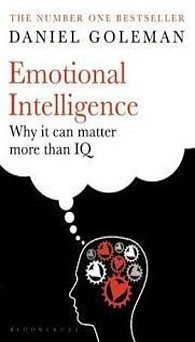
Defining emotional intelligence
A concept that has fascinated me for years is emotional intelligence, and how you can improve your emotional intelligence. Before we start talking about how we can improve our emotional intelligence and why it’s important to do so, we need to first understand what it’s all about.
The concept of emotional intelligence, or EI, really came onto the scene in 1995 when Daniel Goleman released his book “Emotional Intelligence – Why it Can Matter More Than IQ”. Psychologists, sociologists, management consultants and HR professionals around the globe flocked to buy the book and learn more about this concept that might be more important to one’s success than their intelligence. Everyone wanted to know about it.
You click on the image below to purchase the book.

Goleman explains that there are five elements that define emotional intelligence. They are:
1 Self-Awareness
People who are emotionally intelligent are typically very self-aware. This means that they understand their own emotions. They don’t let their emotions rule them, and they are highly in tune with why they are feeling the way they are feeling. They also understand the situations and triggers that cause them to react with particular emotions.
People with high self-awareness have a tendency to trust their own intuition. They are more likely to be willing to self-reflect, and really take a good honest look at themselves, including how they handle situations and conversations. They are open to understanding their own strengths and weaknesses, and to improve themselves where they see room for improvement.
2 Self-Regulation
People who self-regulate have the ability to control their emotions, their emotional responses, and their impulses. They are not typically overly jealous or angry people. You won’t see someone with high self-regulation display an outburst of temper. These people think before they act. They usually appear to be calm and in control, even in the face of difficulty or what seems like a stressful situation to others.
People who can self-regulate tend not to make quick and careless decisions. They appear to have high levels of integrity, the ability to say no, thoughtfulness and a level of comfort with change and uncertainty.
3 Empathy
We all know people with empathy. That wonderful ability to understand other’s points of view, and to be willing to walk in the shoes of others to understand how they feel. They have that amazing ability to really listen to others and be able to relate to them. Empathetic people can recognise how others are feeling, can read their body language and facial expressions well. People high on empathy can recognise subtle changes in behaviour and expressions that may not be obvious to others.

People with empathy have the ability to make people feel comfortable, welcome and accepted. They tend to be less judgmental, are less likely to stereotype others, and tend to be honest and open people. They like to learn about other people, as they recognise that knowing others can also improve their understanding of themselves and their own place in the world. They are good at managing relationships, and anticipating the responses of others.
4 Social Skills
Social skills are another indicator of emotional intelligence. People with great social skills tend to work well in teams, and recognise the benefits in helping others and bringing out the best in others rather than always putting themselves first. In a team setting, they recognise that lifting others and celebrating their achievements brings a superior result than focusing on themselves. They are skilled communicators, they can diffuse conflict situations, and look for positive outcomes. They have the ability to build and maintain positive relationships.
People with good social skills are always the people I gravitate towards in a social situation. They have this uncanny ability to make people feel comfortable and included.
5 Motivation
People who are emotionally intelligent are typically motivated, productive, and effective. They are able to focus on long term success as opposed to wanting everything right here and now. Motivation comes from within, they don’t rely on others for their motivation. People with motivation tend to want to seek out new things and new challenges, to observe, learn and gain knowledge.
Emotional intelligence and success
Emotional intelligence is all about the behaviours and attributes that are foundational for our long-term success.
It is clear that these skills might be even more important the IQ. Whilst intelligence is obviously important, being a great ‘people person’ can really take you places. Someone with a huge IQ who can’t work with people is unlikely to be successful. An example (that I see many times over in workplaces) is the super intelligent worker who just can’t get along with people. They rub people the wrong way, and leave you with a sense that if you never have to work with them again you’d be happy. They don’t function well in a team, and are unable to bring people along with them on the journey. They might even make you feel uncomfortable with their lack of social graces, and you certainly don’t want to go out of your way to help them. We’ve all met this person, right?
Even more damaging than the worker with poor EI skills is the leader. If you’ve ever worked for an individual with low emotional intelligence, you will know how soul destroying that can be.
How to improve your emotional intelligence
Whether you work from home for yourself, or in a work environment with others, being emotionally intelligent will help you be successful. You can learn and develop to improve your emotional intelligence.
You can take an emotional intelligence quiz here to see how you’re going:
https://www.ihhp.com/free-quizzes
You will need to fill in your name, email and a few other details. They won’t spam you.
Here are a few tips on how you can improve your emotional intelligence.
- Consider the five elements. Do they resonate with you? How do you think you stack up against the descriptions? How did you go in the quiz – did you learn anything about yourself? What are your weaknesses? Look at your self honestly.
- Reflect on how you react towards people and situations. Do you take in information and consider it? Or do you make judgments without knowing the full story? Do make stereotypical assessments that cloud your thinking? Do you try to understand the point of view of other people, or do you assume you know what they’re experiencing and why? It’s important to practice your listening skills, put yourselves in the place of others, and really try to understand their perspective. Don’t be quick to make judgments, and be open to accepting the needs and perspectives of others.
- Consider your behaviour when you’re working in a team. Do you allow others the chance to shine? Do you demonstrate humility? Are you wanting all the attention and accolades? Practice putting the focus on others and be less concerned with getting all the praise for yourself.
- Think about how you respond in stressful situations. Do you get upset, blame others, and become angry? Or do you remain calm in difficult situations? Practice keeping your emotions in check when things don’t go away.
- Consider how your actions impact others. If you hurt someone’s feelings, it is very important that you apologise. Apologising doesn’t demonstrate weakness, it actually shows strength of character. You will never build good relationships if you can’t make things right when you’ve done the wrong thing. When you make decisions, consider the feelings of others. Put yourself in their shoes. How will it feel to them if you make this decision?
Our behaviours and words impact other people. Remember that we CAN improve our emotional intelligence. When we do, we are likely to improve the way that others perceive us, and also how we feel about ourselves. We know that people who are highly emotionally intelligent tend to be more successful in life.
If you are working with or for people low on emotional intelligence and you want to change your situation, you can read about the platform that changed everything for me, here.
Here’s to your success, in whatever you do!
Leave me a comment or a question below and I’m always happy to help.

Hi Melissa,
Great article! I really like that you mention about Daniel Goleman’s book. I read it a long time ago, but we tend to forget things. Thanks for reminding the five steps.
Hi Dany, you’re welcome. I’m glad you got something out of my post, and I thank you for stopping by and sharing your thoughts.
Cheers
Melissa
Wow this is a very inspirational article thank you for sharing. Are there any other books that you would recommend to help build Emotional Intelligence? Have there been any significant discoveries in this field since the release of Daniel Coleman’s book?
Hi Chad, there have been a few significant books published since Daniel Goleman’s original. Let me go and research the better ones and I’ll come back to you.
Thanks for stopping by and I’ll be in touch soon.
Cheers
Melissa
Great post! Regulating your emotions and developing emotional resilience is a huge part of emotional intelligence. Instead of being reactive to something that usually bothers us we become proactive. I like to sit there for an hour a day and let my emotions come up and integrate, I found it helps massively as in this day and age we do everything we can to escape our emotions through alcohol, drugs, television etc. I have added that book to my list, thanks!
Hi Kourtney, thanks so much for sharing your thoughts here. You sound like you truly understand EI and the benefits to our wellbeing when we stop and reflect, and process our emotions. Thank you Kourtney and I wish you all the very best.
Cheers
Melissa
Great piece Melissa, I guess I’m empathic then? I better be nice 🙂
At first I thought what’s this piece doing amongst the affiliate news? But then that got me looking through your other blog headlines and I see that your site is full of bits of wisdom. Great juxtaposition between head balance and work balance. I look forward to wandering about your site further.
Catch yer soon
nOrm
Hi Norman, I’m sure you are empathic and I’m so glad that you’ve shared that here!
Yes I love writing about psychology and leadership and all those so called ‘soft skills’ as I believe that understanding ourselves and each other makes us better business people. There is a true business case for it and we can all improve our own productivity and working lives with an appreciation of things like personality and motivation. I look forward to seeing you on my site again.
Cheers
Melissa
Interesting article. I think emotional intelligence is definitely more important than having a high IQ. There are managers where I work who are highly intellectual, but have no people person skills whatsoever. This reflects on the whole office team dynamic, and ultimately the team as a whole are less productive because they are ineffective and lack emotional intelligence.
Thanks for sharing.
Hi Mark, it’s awful isn’t it. I think we’ve all experienced working with or for the intellectual who just cannot work well with others. It can have a huge impact on morale and productivity. If that person happens to be very senior in an organisation, the whole organisation can change. I have seen it happen – a once stable organisation starts to implode because of a key individual who undoes it all.
EI is such a core skill that it should form a large part of any recruitment process.
Thanks for stopping by and sharing your thoughts.
With thanks
Melissa
Love your article, especially the explanation of the elements of emotional intelligence.
Thanks Kathee, it sure is a fascinating topic. Thanks for stopping by and sharing your thoughts.
Cheers
Melissa